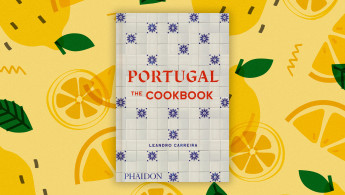How Arab and Moorish culinary innovation reinvented Portuguese cuisine
“To these new rulers, cuisine was an art, and food a gift from God that should be consumed in moderation and shared with those in need.” So writes Leandro Carreira, the chef and author of Portugal: The Cookbook, about the Arabs and Amazigh (the Moors) who conquered the Iberian Peninsula in the early 8th century and ushered in a food revolution.
That 800 years of Islamic civilization in Spain and Portugal influenced the evolution of Portuguese cuisine is no surprise but it’s still striking how extraordinary that impact has been. In this new cookbook of roughly 700 recipes, half of them draw influence from the Moors.
When the Moors arrived, they brought the warriors and administrators needed to rule over newly-acquired land; but along them came architects, astronomers, poets, and cooks armed with cookbooks, such as the famous Medieval Baghdadi Kitab al Tabikh.
"The Moors popularized sour oranges, lemons, apricots, dates, melons, and watermelons; their use of spices such as pepper and ginger, pickling of olives and nuts, sour marinade to preserve fish, and rose and orange blossom water have likewise left their indelible mark"
The Moors’ more advanced civilization introduced hydraulics that allowed for the irrigation of farmlands (along with orchards and leafy gardens).
Moors also beautified the land elsewhere by planting citrus trees alongside streets both for the fruit and scent.
The list of crops introduced by Moors is remarkably long: eggplant, artichoke, carrot, lentils, cucumber, and lettuce among many others. The lettuce would later lend its name to the residents of Lisbon, who are colloquially known as Alfachinhas (“little lettuces”).
|
The Moors popularized sour oranges, lemons, apricots, dates, melons, and watermelons; their use of spices such as pepper and ginger, pickling of olives and nuts, sour marinade to preserve fish, and rose and orange blossom water have likewise left their indelible mark.
And the popular Portuguese art of dipping fish in flour and deep-frying it in oil similarly originates in Moorish cooking. Moors from Mesopotamia, for their part, were taken aback by the wonderful new array of sea fish; they had been accustomed to freshwater fish.
The Moors’ vinegary salads soaked in spring water were the precursor to gazpacho. And sugarcane crops were planted, which the Portuguese later exported to their colonies and gave us the global sugar boom (harvested by slaves) that transformed sugar – from the Arabic sukar – from a luxury to a basic staple enjoyed by everyone.
Naturally, the North African Moors crossing into Iberbia via Gibraltar carried bags of couscous with them. The rolled wheat semolina quickly became a staple in the regional diet until the late 16th century when it was replaced by cereals that were less time-consuming in preparation.
To this day, however, there are villages in the northwestern part of the country where couscous is still handmade using the same methods and utensils employed by the Berbers 900 years ago.
The Moors cultivated not only ingredients and recipes but also the spirit of hospitality and conviviality at the dining table along with the order in which food is served: soups followed by fish or meat and ending with sweets.
"While Moor rule over Iberia eventually came to end, the legacy remains visible and flavourful. Even recipes that are not halal (served with pork) are often rooted in Moor cooking with the original made with non-pork meat or fish"
The Arabs’ cousins, the Jews, it is worth mentioning, also played their part in shaping Portuguese cooking. Observant Jews had to prepare their post-Sabbath meal before the Sabbath, which meant laying aside a slow-burning stew that would be ready the next day.
Today, the Portuguese call it Adafina, a savoury mix of meat, chickpeas, collard greens, hard-boiled eggs, and vegetables. And it was the Jews who introduced deep-fried vegetables, which Portuguese missionaries later brought to Japan, and thus we have tempura.
While Moor rule over Iberia eventually came to end, the legacy remains visible and flavourful. Even recipes that are not halal (served with pork) are often rooted in Moor cooking with the original made with non-pork meat or fish.
What Portugal: The Cookbook beautifully demonstrates is the deep interconnectedness amongst peoples and the arbitrary nature of the now-fashionable but fraudulent effort to impose discrete borders around cuisine and scream “cultural appropriation” toward any perceived violator.
What we eat cannot be so easily grouped into a dichotomy of us and them. Food, even more than language, tells a story of interwoven humanity.
Portugal: The Cookbook continues the new tradition of cookbooks conveying the history behind the food and makes a fine addition to any kitchen where Mediterranean cooking is favoured.
Khelil Bouarrouj is a Washington, DC-based writer and civil rights advocate. His work can be found at the Washington Blade, Palestine Square, and other publications.


![Minnesota Tim Walz is working to court Muslim voters. [Getty]](/sites/default/files/styles/image_684x385/public/2169747529.jpeg?h=a5f2f23a&itok=b63Wif2V)






